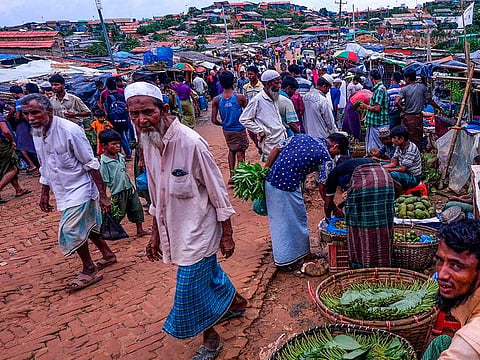Hopes fade for return of Rohingya people to Myanmar
Myanmar government should provide essential services for welfare of persecuted minority

Two years after three quarters of a million Rohingya Muslims were expelled out of Myanmar, the United States recently announced sanctions against the Myanmar military chief and three other generals for their role in brutalising the community. These sanctions are the most visible sign of US disappointment at the Myanmar’s botched political reform process launched in 2011. Violence against Rohingya triggered an ethnic cleansing, compelling them to seek refuge in neighbouring Bangladesh. Reports continue that Myanmar’s military is still committing human rights violations and abuses throughout the country. The bans can affect the generals and their families but will do little to change the majority Buddhist attitude towards the Rohingyas.
The International Criminal Court in The Hague, following reports that senior UN officials downplayed human rights abuses, has started a preliminary probe of mass killings, rape and genocide of the community. Another report written by the former Guatemalan Foreign Minister and UN Ambassador, Gert Rosenthal, has characterised the crises as “a systemic failure”.
The system failed because the individuals did not fulfil their responsibility, says Nay San Lwin, an activist with the Free Rohingya Coalition (FRC). Lwin disclosed that, in 2012, then Myanmar President Thein Sein told Antonio Guterres, who was then the UN High Commissioner for Refugees, of plans to detain the Rohingya in camps and sought his help for their removal from the country. While Guterres dismissed the request publicly, FRC says, “Myanmar’s intent to commit international crimes was made clear to the most senior levels of the UN.”
Myanmar government should provide essential services needed to ensure civilised existence and growth of Rohingya. This is the moral question facing all five permanent members of the security council and other major world powersSajjad Ashraf
Since then Rohingyas have been subjected to systematic discrimination.
Stripped of citizenship and largely interned in camps, the Rohingya have been denied basic civic facilities and economic opportunities. The Buddhists, united on the question, see the Rohingya as intruders and refer to them as Bengalis. Even those whom the government is prepared to take back will only be treated as aliens.
Also Read: UN: Possible fresh war crimes in Myanmar
Two previous expulsions of about half a million Rohingya occurred during 1998 and 2002. About one and quarter million Rohingya now live in Bangladesh with a little hope of ever returning home. More Rohingya now live outside Myanmar than inside the country. Those who remain, live in a state of continuous fear in virtual concentration camps with little provision for basic human services.
Invoking a law under which burnt land is taken over by the state for management, satellite images show hundreds of new houses in 42 settlements being built over lands where Rohingya once lived. In a campaign led by Buddhist nationalists and aided by the government, these houses are being occupied by Buddhists from around the country, thus, changing the demographic character of the state. By removing all the Rohingya landmarks, the Myanmar government is making it impossible for the Rohingya to return to their places of origin. The aim of these resettlements according to Yanghee Lee, UN Human Rights rapporteur, is to make Rohingya departure irreversible. The images also confirm that security forces are building new facilities for their own use over the cleared lands.
The Myanmar government’s ostensible plan to house any returning refugees in camps runs contrary to November 2018 agreement signed with Bangladesh that stipulated that Rohingya could return to their homes or nearby places of their choosing. Not one refugee has returned under the circumstances of lurking fear.
The burden of looking after the Rohingya falls disproportionately on Bangladesh whose interest is focused on repatriation of these people back to Myanmar. They do not want to make policy choices that may be considered at cross purpose with Bangladesh’s interest in returning the refugees back home.
With no near-term prospects of returning back home, almost a million Rohingya in Bangladeshi camps face an uncertain future. Fearing their permanent settlement, the Bangladesh government has banned the provision of formal education in the camps. Allowing formal education and provision of basic health care need to be top priorities so that the future of Rohingya children can be helped by bettering their lives. In this context, it is important that restrictions allowing the Rohingya to prepare for the uncertain future should be eased. A community living without hope is a sure recipe for further degradation.
Rohingya suffer from an antipathy from the predominantly Buddhist majority in Myanmar. International pressure can help momentarily but cannot make the prejudice go away. Rohingya can only go back in security only if the Rakhine state in Myanmar is placed under international security cover, allowing the Rohingya to return home in safety. Myanmar government should be bound to provide essential services needed to ensuring civilised existence and growth of the persecuted minority. This is the moral question facing all five permanent members of the security council and other major world powers.
— Sajjad Ashraf served as an adjunct professor at the Lee Kuan Yew School of Public Policy, National University of Singapore. He was a member of Pakistan Foreign Service for 1973 to 2008 and was Pakistan’s Consul General in Dubai during the mid 1990s.
Sign up for the Daily Briefing
Get the latest news and updates straight to your inbox



